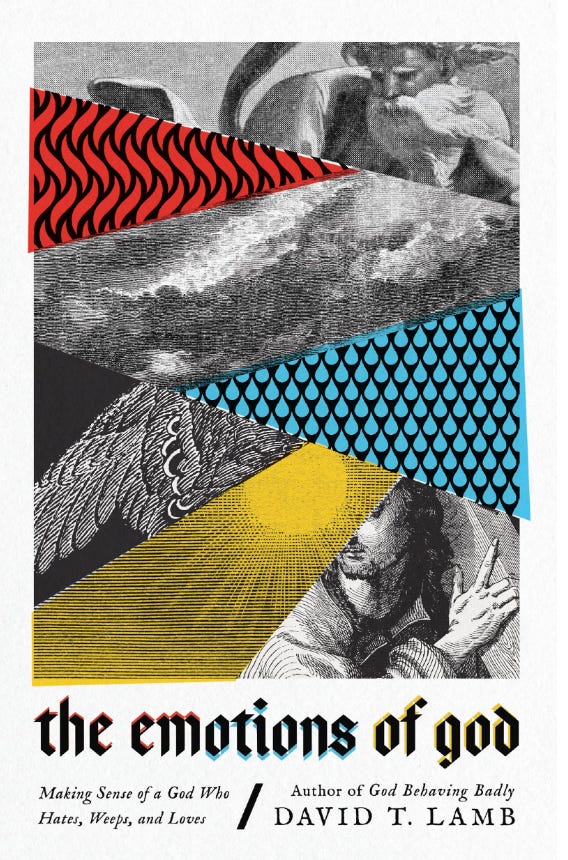The tov-est people I know detest and despise injustices like racism and sexual abuses. They despise these acts for what the harm they do to people. The tov-est people I know, in other words, are ones in whom I see hatred as it should be.
Apathy about heinous behaviors in our world indicates a deformed character that cares too much about itself. It is because I see hatred in tov people that I encounter moral fibers at their finest. Morally sensitive humans ought to hate evil and injustice.
Even more so God.
I find it strikingly inconsistent for people who are activists, and for people who despise and hate injustices and evil, to believe affirming hatred on the part of God is wrong. They are the ones in whom one often sees the purest forms of hatred of evil!
Yet, I know some people like this idea of divine hatred for all the wrong reasons. They exploit it to be mean. What follows turns that idea upside down.
David Lamb, in his new, thoughtful must-read, The Emotions of God: Making Sense of a God Who Hates, Weeps, and Loves, expounds on the emotions of God in the Bible, and his first substantive chapter is about hatred – God’s and ours.
Here we go.
God hates pride (Psa 5:5), divorce (Mal 2:16), robbery and wrong (Isa 61:8), violence (Psa 11:5; Ezk 35:6), and evil and wickedness (Pss 5:5; 11:5; 45:7).
God hates evil “because he loves justice… because he loves good … and because he loves righteousness” (cf. Isa 61:8; Amos 5:15; Psa 45:7).
David Lamb says it right: “God’s hatred of these things is part of what makes him good.”
Or this list from Proverbs 6:16-19 of “God’s least favorite things”:
Prov. 6:16 There are six things the LORD hates, seven that are detestable to him 17 haughty eyes, a lying tongue, hands that shed innocent blood, 18 a heart that devises wicked schemes, feet that are quick to rush into evil.”
Here the proverb-ist maps body parts for its sins and evil.
Such sins harm God’s good creation, humans made in God’s image.
And thus, God hates evil people for doing evil to image-bearers. God hates the person who stirs up strife (Prov 6:19), evildoers (Psa 5:5), and those who love violence (Psa 11:5).
Can a person be good and righteous and not hate evil?
Why does Scripture say God loved Jacob but hated Esau?
Does it mean he loved Esau less, as Genesis through Joshua would indicate when God blesses Edom, but less than Israel?
Does it mean God did not choose Esau as God chose Jacob, as Romans says in 9:13?
Or, does it mean God judged Edom – and that’s what Malachi, where this text is found, states. In Malachi Edom is judged and disciplined for its evil, and that’s what this text is referring to in that context. Malachi 1:1-5.
A prophecy: The word of the LORD to Israel through Malachi.
“I have loved you,” says the LORD.
“But you ask, ‘How have you loved us?’
“Was not Esau Jacob’s brother?” declares the LORD. “Yet I have loved Jacob, but Esau I have hated, and I have turned his hill country into a wasteland and left his inheritance to the desert jackals.”
Edom may say, “Though we have been crushed, we will rebuild the ruins.”
But this is what the LORD Almighty says: “They may build, but I will demolish. They will be called the Wicked Land, a people always under the wrath of the LORD. You will see it with your own eyes and say, ‘Great is the LORD—even beyond the borders of Israel!’
David Lamb then contends we need to learn a divinely-approved kind of hating, and we can find an example in Psalm 139, where the psalmist says “I hate them with complete hatred.” The psalmist hates God-haters and evildoers; the psalmist wants God to probe his heart to see if there’s wickedness in his emotions; the psalmist does not go out into violence but stays put and prays these things, leaving justice up to God.
Jesus, too, speaks of hatred and he does use the Love more, love less idea in Luke 14:26 (hating one’s parents for rejecting his kingdom mission).
He’s against the use of the “hate the sin, love the sinner” cliché.
David knows we are to resist evil and not to become complicit in it.
We can learn a divinely-shaped hatred for evil in prayer, in imprecations, and in pursuing justice in our world.
But this we should know: evil “affects God emotionally” and “elicits a highly negative emotional response from the God of the universe.”
Thus, God “hates intensely because he loves intensely.”






“We can learn a divinely-shaped hatred for evil in prayer, in imprecations, and in pursuing justice in our world.” This really resonates after reading Cursing with God by Trevor Laurence. His discussion of how the imprecatory psalms align with loving and praying for one’s enemies is compelling. He writes, “One must love rightly in order to hate rightly, but there are times when one must hate truly in order to love fully.”
I'm not sure where David Lamb will take us in this book. What I can say is this: According to the apostle John, God is in very essence LOVE. That tells me that everything - EVERYTHING - that in any way does not "support" love must be destroyed. All those killings in the First Testament were in support of making love possible. God's essence is challenged by any of us in every action motivated by anything but real agape love. I don't think we've begun to grasp the meaning of Love as God intends it.